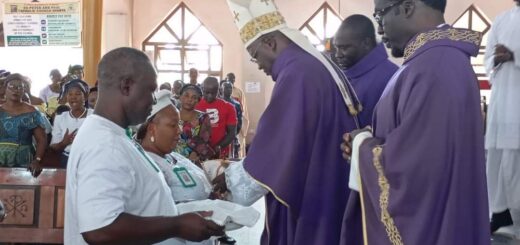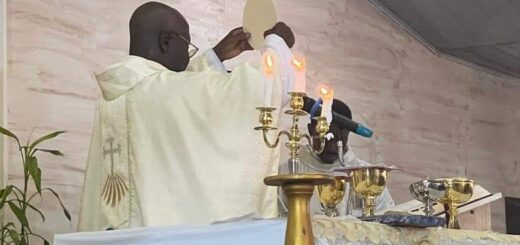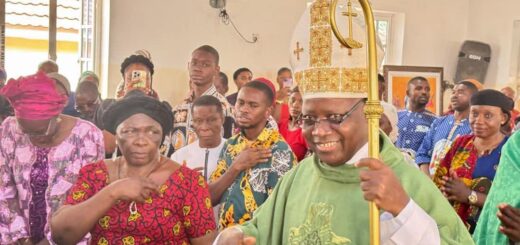“Here am I, send me”
by ARCH BISHOP · February 6, 2022
5th Sunday in Ordinary Time, Year C, St. Martin of Tours Parish, Lugbe, Abuja, 6th February, 2022, Homily by Archbishop I. A. Kaigama.
Readings: Is. 6:1-2, 3-8, 1 Cor. 15:1-11, Lk. 5:1-11
Theme: “Here am I, send me”
A careful reflection on our readings today reveals the feeling and expression of unworthiness by three great personalities (Isaiah, Paul and Peter), having been called by God. Isaiah said: “I am a man of unclean lips” (Is. 6:5), Paul admitted: “I am the least of the apostles” (1 Cor. 15:9), and Peter pleaded: “Leave me, Lord; I am a sinful man” (Lk. 5:8). They all acknowledged their unworthiness, weaknesses and shortcomings, indicating that they needed God’s grace and blessing in order to succeed in their mission.
The first reading speaks of the call of Isaiah as a prophet. Isaiah’s call came at a period in the history of Israel’s unfaithfulness to God. The nation got involved in unholy political schemes in the vain attempt to secure their safety rather than depend on God’s protection. Isaiah in the vision saw the Lord sitting on a throne; Seraphs singing “Holy, Holy, Holy is the Lord of hosts; and the “house filled with smoke” (cf. Is. 1:1-4). He heard the voice of the Lord saying, “Whom shall I send, and who will go for us?” And Isaiah said, “Here am I; send me’” (Is. 6:8).
The spiritual experience in the call of Isaiah teaches us that before we can minister to others, we must first of all permit God to minister to us. Our world today, like Judah in the days of Isaiah, is morally sick and decaying, and we are called to redeem it. In calling us, God tells us not to mind our human weakness but rather to trust in His grace and mercy for us.
The text of the second reading was St. Paul’s defence of his authority to preach the Gospel. He speaks of his call: “Last of all, as to one untimely born, he (Christ) appeared also to me. For I am the least of the apostles, ‘unfit to be called an apostle’, because I persecuted the Church of God” (1 Cor. 15:8-9). His call is described also in Acts 9:3-6, where Paul recounts how he found his vocation. He acknowledged his past sins, and attributes his call to the miracle of grace, “Though it is not I, but the grace of God working in me” (1 Cor. 15:10).
The Gospel speaks of Peter’s call, who, “amazed at the catch of fish” (Lk. 5:9), left everything and followed Jesus (cf. Lk. 5:11). As Lumen Gentium #31 says, Every Christian is commissioned to share in the priestly, prophetic, and kingly functions of Christ. So, as a teacher, a government official or employee, doctor, farmer, trader, politician, nurse, engineer and others, you share in the apostolate of preaching, teaching, and witnessing to Christ. We are called to be courageous witnesses of Christ in a society where people are drowning in sin. We must learn from the experience of Peter to “Put out into deep water and lower your nets for a catch” (Lk. 5:4).
Peter’s experience teaches us that, it is not human logic or professional skills or expertise that produces great results; ultimately, it is obedience to God that produces the best results, for “God’s ways are not our ways” (Is. 55:8).
The Holy Spirit we receive at confirmation is not a Spirit of fear or timidity. It is the Spirit that enkindles in us the fire of divine love; to strengthen us in our weakness, and makes us to be able to say like Isaiah, “Here I am, Lord send me”. May we be true “fishers of men”. If by our conduct and life each of us brings one person like Andrew brought his brother Simon to Christ, we would be doing a lot. We can do this if we leave everything to follow Jesus. Here, “leaving everything” does not necessarily mean all our material possessions, but leaving our accumulated sin of corruption, injustice and hatred to follow Jesus with an undivided heart and mind (cf. Lk. 5:11).
In this pandemic era when we are often masked, it is difficult to know the correct identity of who is behind the mask. However, no matter how masked we may be, God knows us as we are, through and through. Nothing is hidden from God’s sight before whom we must give account (cf. Heb. 4:13). Today we are encouraged to accuse ourselves and admit personal guilt, as we say at Mass, ‘through my fault, through my fault, through my most grievous fault’, with a broken spirit and a broken contrite heart. In Hausa we say, “Laifi tudu ne sai ka hau naka kafin ka ga na wani” (you need to climb the heap of your own faults before you can see those of other people).
At this time of political sensitivity, politicians will be pointing fingers of blame with hypocritical indignation at one another, seeing the speck in the others’ eyes but failing to see the big log in theirs. They should first rid themselves of the very dirt in their hearts or political package as they and their political parties fight for electoral victory, presumably, to make our country better.
Our nation is in danger of toiling all night without catching any fish, which is why hunger and poverty increase, crime, violence, unemployment of youths, worsening economic conditions, etc., stare us menacingly in the face. As the waves of electioneering hit the air, we must pray fervently that those seeking political offices will be guided by the genuine interests of the suffering Nigerians, without compromising the electoral process.
May God bless you dear parishioners of St. Martin of Tours Parish, Lugbe, and help you to continue to experience greater spiritual, social and pastoral growth and to do more beautiful things for God, along with your Parish Priest and Dean of Lugbe Deanery, Rev Fr. Anthony Wulfu, and his team of collaborators. May God pour out abundant graces and blessings upon you. Amen.




